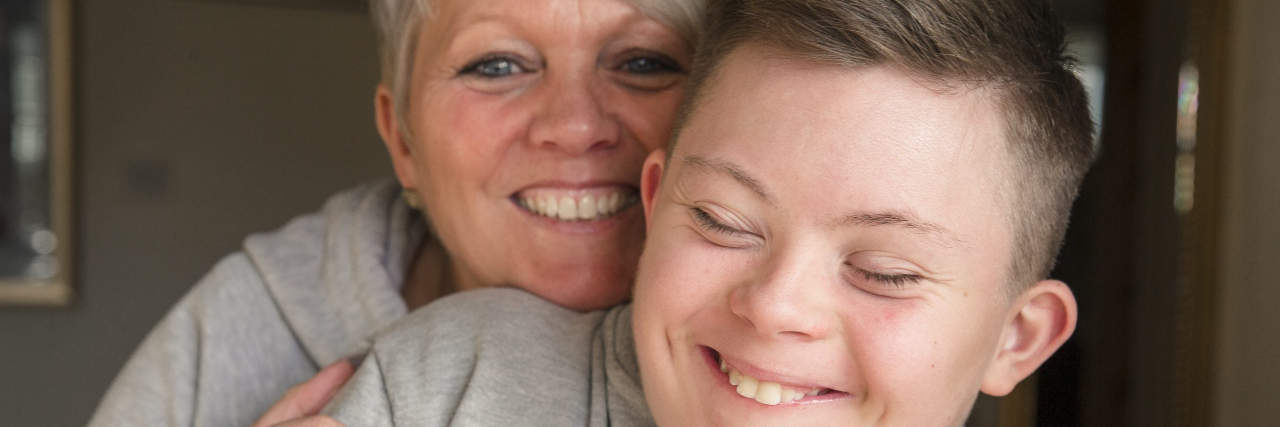We Need to Respect Our Kids' Bodily Autonomy at the Doctor’s Office Too
In the last several years, parents have become increasingly concerned with both teaching and respecting their children’s boundaries. We know it’s not good to force physical affection. We listen when a child says no to over-exuberant tickling. However, when a doctor tells us to restrain our child for a procedure, we rotely do as we’re told. This isn’t as black and white of an issue as some of the other rules around boundaries because we do have to make sure our children get the medical care that they need, but I believe we restrain children — especially those with a disability — far more than we have to.
No doubt, there is a very real dilemma between receiving necessary health care and respecting a child’s physical independence. My 14-year-old son Bobby has Down syndrome and a congenital heart defect that put him under constant medical scrutiny for the first three years of his life. He underwent countless blood draws and imaging exams. I restrained him for all these tests because the interventions were, quite literally, the difference between life and death.
That said, there were very real, long-term consequences to my decision. He became so wary of these tests that for years he would retch uncontrollably when entering a doctor’s office. His symptoms have improved over time, but the trauma is still with him even today.
During those early years, physical restraint was a necessary evil. I did what I had to do. However, I do have a deep regret that this modus operandi continued in much less dire situations. Medical personnel tend to rely on restraint because it’s often the quickest and simplest way to gain cooperation — not because it’s the only choice.
I, unsuccessfully, tried to hold 8-year-old Bobby’s head still for a dental exam. I restrained a screaming 9-year-old Bobby while the doctor cleaned wax out of his ears. We’ve had three adults hold him down for blood draws. These restraints were wrong for two reasons. First, the procedures did not fulfill a life-saving need. Second, Bobby was old enough to be reasoned with.
I am a seasoned navigator of the health care system, mostly from dealing with Bobby’s multiple hospitalizations and large medical team. I know that a doctor’s advice should always be subject to questioning — medical professionals are not infallible. But even then, I have sometimes fallen into the trap of unquestioningly following doctor’s orders. When Bobby’s ENT instructed me to hold him down, I did what I was told instead of defending my son’s right to bodily autonomy. In hindsight, I should have slowed down the procedure and either worked with Bobby to facilitate his cooperation or I should have declined the ear wax removal for that visit. There’s always another day and, if it comes to it, there is always another doctor.
As Bobby has gotten older, we have been able to work with him so that he does voluntarily cooperate with medical procedures. Bobby doesn’t understand the exact details of every test he undergoes, but he does have a basic understanding that doctors and nurses work to keep him healthy and strong.
In addition to explaining that medical procedures are a necessary evil, we have developed healthier routines to manage his anxiety. We prep him for each appointment by setting expectations about what is to come. We engage in positive reinforcement, telling him how brave/strong/big he is. I sit behind him and hug him through blood draws. I hold his hand and talk him through imaging exams. I sit at his side while the doctor examines his ears.
Finally, we set realistic expectations for Bobby. After multiple intubations as a toddler, he has significant oral aversions. We have had dentists recommend physical restraints but instead found someone who could and would perform sedated exams/cleanings. Bobby has a paralyzing fear of operating rooms and so we use pharmaceuticals to lessen his anxiety on the occasions he’s going under anesthesia. I have mixed emotions about using drugs, but strongly believe the reduction in trauma is worth it.
Will I ever restrain Bobby again? In an emergency situation, I might have to. I’m not going to allow him to die for lack of cooperation with medical care. However, those situations are fortunately rare. More likely my job going forward is to act as Bobby’s primary defender against a medical establishment that uses physical restraint as the de facto solution to a child’s refusal to cooperate.
Getty image by SolStock.

